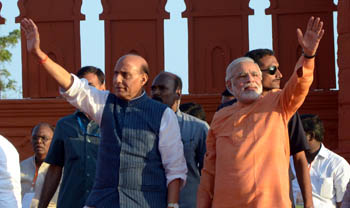 On Board Special Flight, Apr 20: Only Narendra Modi will be the Prime Minister of an NDA government irrespective of its tally in the new Lok Sabha, BJP President Rajnath Singh made it clear today.
On Board Special Flight, Apr 20: Only Narendra Modi will be the Prime Minister of an NDA government irrespective of its tally in the new Lok Sabha, BJP President Rajnath Singh made it clear today.
"Modi will be the Prime Minister of NDA government under any circumstances," he said in an interview on board his chartered campaign aircraft.
The BJP leader's categorical assertion came in response to a question about the possibility of NDA falling short of a majority and any new ally insisting on a different leader, other than Modi.
"The country cannot be ruled only by the laws but by a leader who has moral authority. Only a person who has been projected as the PM candidate or CM candidate will have that moral authority," he said.
Singh dismissed as "unnecessary controversy" Modi's refusal to wear a 'skull cap' (worn by Muslims).
"This is an attempt to make an issue of a non-issue in a planned manner by our political opponents. I wear dhoti-kurta, he (Modi) wears kurta-pyjama, you wear shirt-pant. Is this an issue? They (opponents) want to communalise the country," he said.
He endorsed the BJP Prime Ministerial candidate's refusal to appeal to any particular community for votes
"There should be no appeal to any caste, creed or religion to vote in a particular manner. Everyone has the freedom to exercise franchise and it should be free. We issue appeal to all sections of the society without any discrimination," the BJP chief said.
About addressing the concerns of Muslims, Singh said, "We are gradually removing the apprehensions... Their fear will be removed through dialogue."
Asked whether Modi is going to hold dialogue with Muslim leaders, the BJP chief merely said, "Talks keep happening. Modiji also keeps talking to them. You must have seen Muslims now support Modi."
To buttress his point that more Muslims are now supporting Modi, he claimed that the community members feel "more secure" in Gujarat and that their per capital income is better than their counterparts in rest of the country.
"Gradually, the message is reaching to the Muslims that it was planned propaganda of Congress and other so-called secular parties. They will continue to come close to Modi and BJP and illusion of fear will end," he said.
On 2002 riots, he said the Gujarat Chief Minister has made no mistake and there is no case for an apology.
"Majority of riots took place during Congress rule. Have they (Congress) apologised," Singh shot back when referred to demands that Modi should apologise for the 2002 riots.
Asked whether Congress should apologise first and then Modi will do so, he said, "I am not saying that. Had there been any mistake on part of Modi, had he made no effort to control the riots, then there could be apology.
"But, being the Chief Minister, he made the maximum effort, tried his best, to control the riots. He never tried to scuttle any probe. Then why are there still demands for apology? This is vindictive politics by Congress."
Describing Modi as the "most harassed" politician, Singh said Congress is targeting him as it is "desperate" because of his popularity.
Singh, who gave the interview during his hectic campaigning which involves around three to four rallies per day on an average, was questioned whether Modi would have had better acceptability if the 2002 riots had not taken place.
"Modi has acceptability even now and it is growing. Nobody from any caste or religion is unhappy with him. People understand that Congress has always played the communal card," he said.






Comments
Add new comment